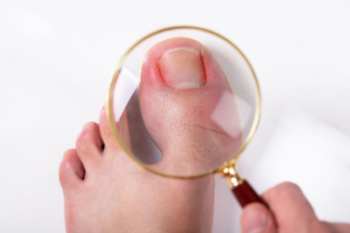
Ingrown toenails account for a significant portion of foot problems, accounting for approximately 20 percent of cases. This condition occurs when the edge of a toenail grows into the surrounding skin, causing pain, swelling, and sometimes infection. Common causes include improper nail trimming, wearing tight shoes, and genetic predisposition. Relief techniques focus on reducing discomfort and preventing further issues. Soaking the affected foot in warm, soapy water can soften the skin and nails, providing temporary relief. Wearing properly fitting shoes with ample toe room and trimming nails straight across, rather than in a curved shape, may help to prevent ingrown toenails. If you have developed this condition, it is strongly suggested that you visit a podiatrist who can successfully treat ingrown toenails, which may include minor surgery for removal.
Ingrown toenails can become painful if they are not treated properly. For more information about ingrown toenails, contact Richard Galperin, DPM of Texas. Our doctor can provide the care you need to keep you pain-free and on your feet.
Ingrown Toenails
Ingrown toenails occur when a toenail grows sideways into the bed of the nail, causing pain, swelling, and possibly infection.
Causes
- Bacterial infections
- Improper nail cutting such as cutting it too short or not straight across
- Trauma to the toe, such as stubbing, which causes the nail to grow back irregularly
- Ill-fitting shoes that bunch the toes too close together
- Genetic predisposition
Prevention
Because ingrown toenails are not something found outside of shoe-wearing cultures, going barefoot as often as possible will decrease the likeliness of developing ingrown toenails. Wearing proper fitting shoes and using proper cutting techniques will also help decrease your risk of developing ingrown toenails.
Treatment
Ingrown toenails are a very treatable foot condition. In minor cases, soaking the affected area in salt or antibacterial soaps will not only help with the ingrown nail itself, but also help prevent any infections from occurring. In more severe cases, surgery is an option. In either case, speaking to your podiatrist about this condition will help you get a better understanding of specific treatment options that are right for you.
If you have any questions please feel free to contact our office located in Dallas, TX . We offer the newest diagnostic and treatment technologies for all your foot and ankle needs.
